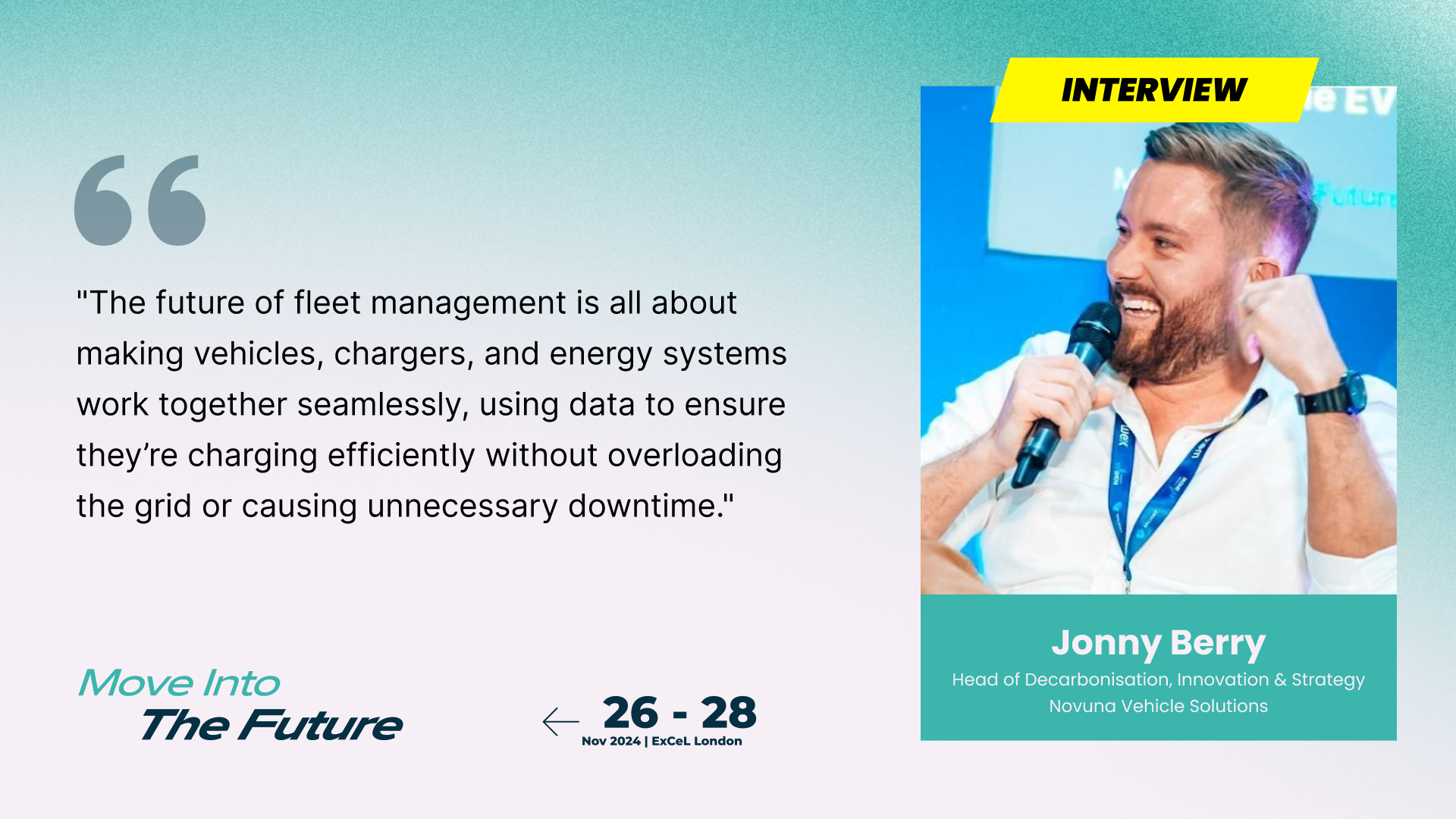We are delighted to present a Q&A session with Jonny Berry, Head of Decarbonisation, Innovation & Strategy at Novuna Vehicle Solutions. With over a decade of experience in electric mobility, Jonny has been at the forefront of the EV industry, earning notable accolades such as Nissan’s Global EV CEO Award in 2016 and the GreenFleet EV Champion in 2020. He also appears in the prestigious GreenFleet 100 most influential people list, recognized for his transformative work in the fleet sector. Jonny’s passion for reducing carbon footprints and improving air quality is evident through his founding of "The EV Café," a platform that fosters collaboration and knowledge sharing within the eMobility community. In this insightful session, Jonny shares his perspectives on the evolution of fleet management, the role of collaboration in accelerating EV adoption, and the future of electric vehicle infrastructure.
#LEVS: With over ten years of experience driving only electric vehicles, how do you see personal experiences influencing professional decisions and strategies in the field of electric mobility?
#Jonny Berry: After driving electric vehicles for over a decade, I’ve seen firsthand both the amazing potential and the areas where there’s still work to be done. The cars themselves are brilliant, and there’s been a lot of education happening, but there’s definitely room for improvement, especially when it comes to charging infrastructure. If you're in the business of setting up charging points, you really need to understand the bigger picture—it's not just about where to plug in; it's about making sure the whole system works smoothly.
We need to aim for the “Tesla experience,” and I’m not just talking about the convenience of plug-and-charge, but also their reliability. To get there, we need to focus on everything: software, open protocols, accessibility, redundancy, and maintenance. It’s all about setting up systems that don’t just work today but are future-proof too, from tech to grid integration, with a strong emphasis on renewable energy. The key is making the whole ecosystem—from vehicles to infrastructure to energy—work together seamlessly.
#LEVS: How do you envision the future of fleet management evolving with advancements in electric vehicle technology and infrastructure?
#Jonny Berry: The future of fleet management is all about making vehicles, chargers, and energy systems work together seamlessly. But here’s where things get interesting—trace and dwell data are going to play a huge role in that. By analysing where vehicles are, how long they stay at different locations, and how much energy they consume fleet managers can optimise charging schedules to ensure the vehicles are charged at the right time without disrupting operations. But we need that access in the first place…that’s why open systems are important.
Sometimes, that means making slight tweaks to operations, like adjusting routes or downtime, to get the most out of charging windows. It’s about using data to be smart, not just about keeping vehicles running, but also ensuring they’re charging efficiently without overloading the grid or causing unnecessary downtime. The goal is to keep things smooth, business-critical, and sustainable, while making sure fleet operations are always a step ahead with the help of advanced EV tech. The next step is how can they be more than just transport, can they play a more important role in supporting the grid get to its needed future capacity, especially when the electrification of heat becomes the norm.
#LEVS: What inspired you to found The EV Café, and how has it contributed to the growth and knowledge sharing within the EV community?
#Jonny Berry: The idea for The EV Café came during a time when businesses were furloughing staff and focusing on staying open. But I felt that conversations around electrification couldn’t stop. So, I set up a weekly two-hour webinar, inviting like-minded people—whether they were working or on furlough—to keep the dialogue going. It was a casual, open space for discussing all things EV.
What really surprised me, though, was how much it helped people’s mental health. It became more than just business talk—it turned into a community where people could connect and feel supported. Looking back, I’m as proud of that as I am of the business itself. The EV Café will always be about educating and supporting those looking to transition to electric vehicles, creating a space for knowledge sharing and community.
#LEVS: How important is collaboration between the private sector, government, and other stakeholders in achieving widespread adoption of electric vehicles?
#Jonny Berry: Collaboration is absolutely key to making EVs mainstream, and this includes the vital role of grants. These government-backed funds help drive innovation across the board. The private sector, government, and other stakeholders need to work together to build a system that encourages EV adoption. And that’s where associations like The EV Café, BVRLA, REA, Logistics UK, AFP, and others come in. They play a crucial role in connecting the dots between different sectors—helping businesses, policymakers, and consumers align on what’s needed.
These associations make sure that government incentives and policies are working hand in hand with what the market requires, from grid capacity to charging infrastructure. Without these kinds of partnerships, the transition to electric vehicles just wouldn’t happen at the pace we need. The more collaboration, the faster and smoother this transition will be.
#LEVS: You have been part of the London EV Show in previous editions as well. How do you see the importance of such events in advancing the electric vehicle industry and fostering collaboration among stakeholders?
#Jonny Berry: Events like the London EV Show are vital for pushing the industry forward. They bring together everyone involved—whether you’re a manufacturer, a charger provider, a policymaker, or someone just passionate about EVs. These events spark conversations, build partnerships, and let people showcase the latest tech and innovations. More than just networking, they’re essential for driving real progress and fostering collaboration across the industry. Plus, face-to-face interactions at these shows often lead to the kind of cooperation that really moves the needle in the EV world.


